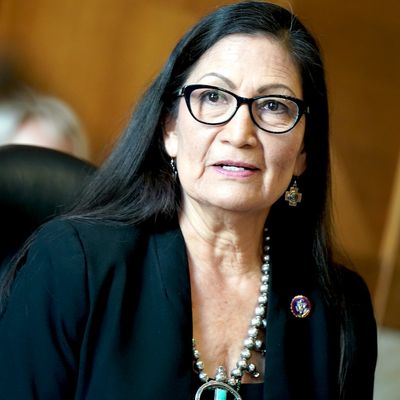
As promised, Deb Haaland is making missing and murdered Indigenous women a priority in her first weeks as secretary of the Interior. On Thursday, Haaland — the first Native American official ever appointed to a government agency that oversees tribal lands — announced a new unit in the Bureau of Indian Affairs, dedicated to probing previously overlooked disappearances and deaths of American Indians and Alaska Natives.
“Violence against Indigenous peoples is a crisis that has been underfunded for decades,” the Interior secretary said in a statement. “Far too often, murders and missing persons cases in Indian country go unsolved and unaddressed, leaving families and communities devastated. The new MMU [Missing & Murdered Unit] will provide the resources and leadership to prioritize these cases and coordinate resources to hold people accountable, keep our communities safe, and provide closure for families.”
In Congress, Haaland — who is a member of New Mexico’s Laguna Pueblo tribe — was instrumental in passing legislation obligating the federal government to more closely track and investigate missing and murdered Indigenous women and girls. When she was confirmed as Interior secretary in mid-March, she pledged to keep working on an issue government has long neglected. Research funded by the Department of Justice has found that, in some areas, American Indian and Alaska Native women living on tribal lands are murdered at rates more than ten times the national average. The Centers for Disease Control and Prevention lists homicide as the third-leading cause of death for these groups, and according to the Urban Indian Health Institute, of the 5,712 American Indian and Alaska Native women and girls reported missing in 2016, only 116 made it into the Justice Department’s federal missing-persons database.
The UIHI has documented widespread failures on the part of law enforcement to accurately categorize native people in case records and data systems. Not only that, but police have also created financial barriers to accessing information on missing and murdered persons, the UIHI found.
“Law enforcement was effectively hiding the disproportional impact in our communities by the non-collection of race and ethnicity,” UIHI director Abigail Echo-Hawk told ABC. “As a result of that, for many years, when our tribal leadership would go to them and push for resources and highlight this issue, they’d say, ‘but where’s your data?’ But we know the data isn’t there because they’re not collecting it. This is purposeful erasure.”
Haaland’s MMU will expand on the work of a 2019 task force, called Operation Lady Justice, created to re-examine “unresolved cases,” her statement says. It will work with tribal investigators, as well as investigators with the FBI and the Bureau of Indian Affairs, and will involve new positions focused seemingly intended to address data-collection gaps. Haaland described the MMU’s efforts as “all hands on deck.”
Speaking to ABC, Echo-Hawk emphasized that she hopes the investigative component would be “just the start,” and that prevention would become a primary goal. “It’s not enough to search for them when they go missing or investigate the crimes when they’re murdered,” she said. Still, she continued, “We see what representation looks like. You have an Indigenous woman leading as secretary of the Interior with the authority and the ability to address some of the most pressing crises in Indian country.”


